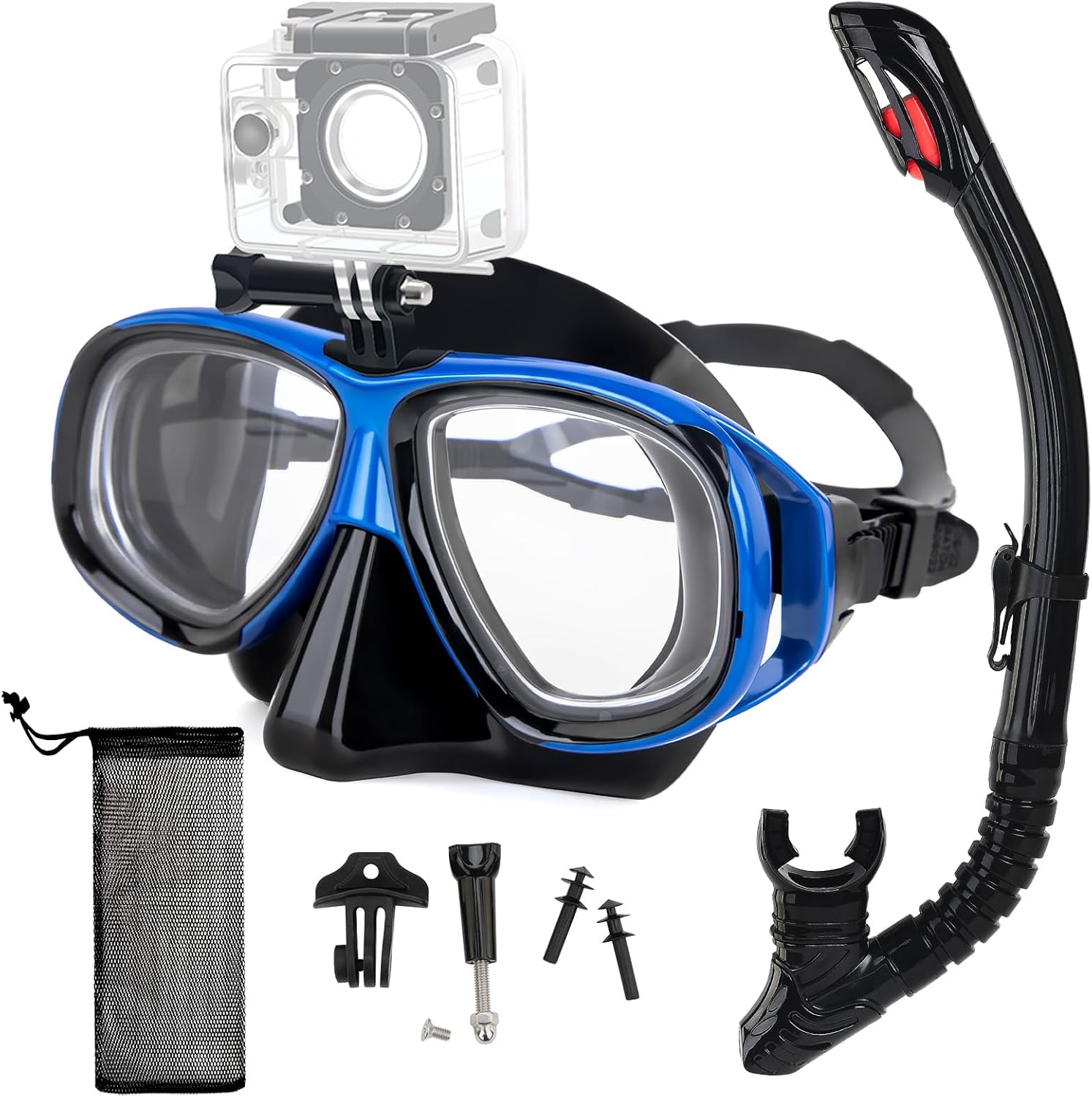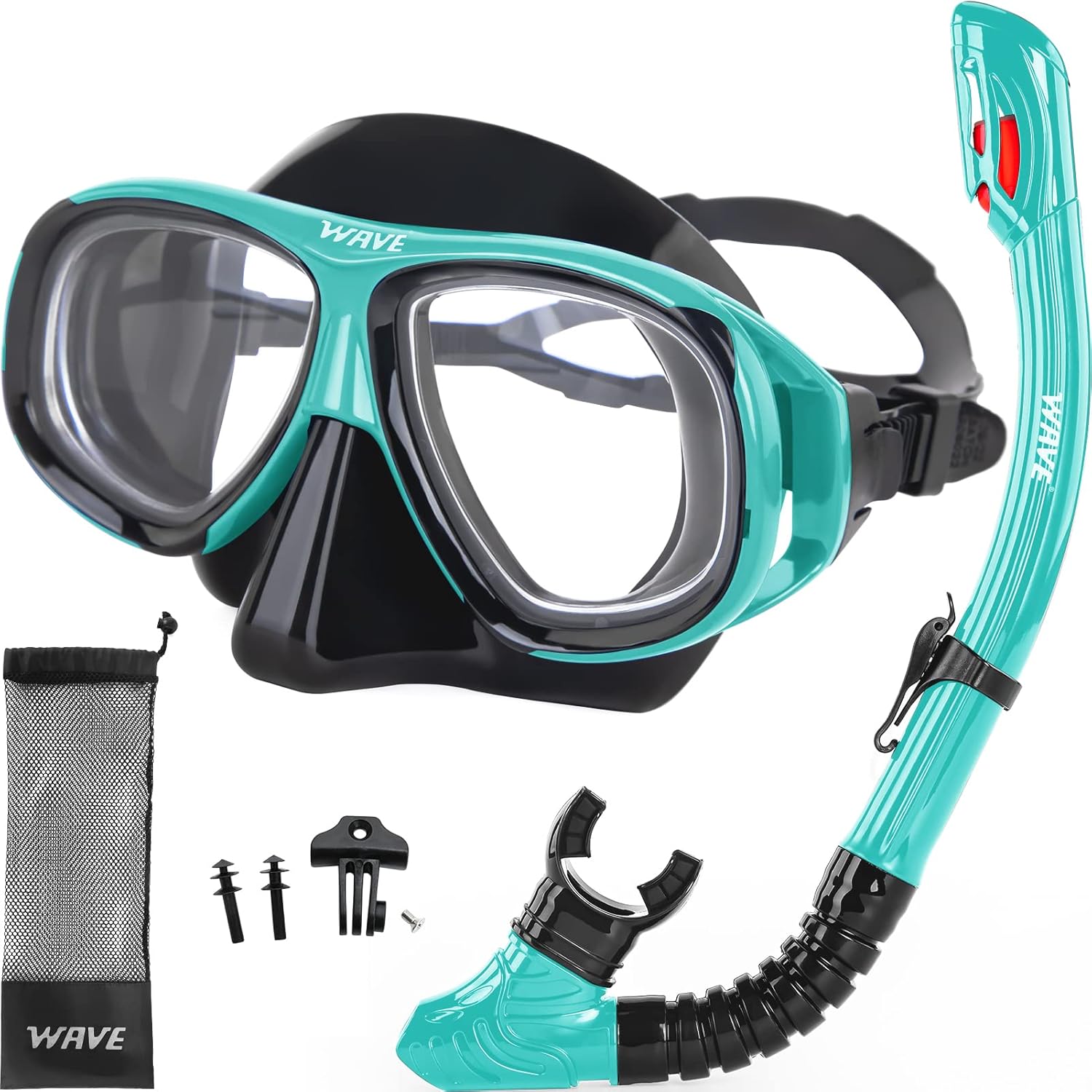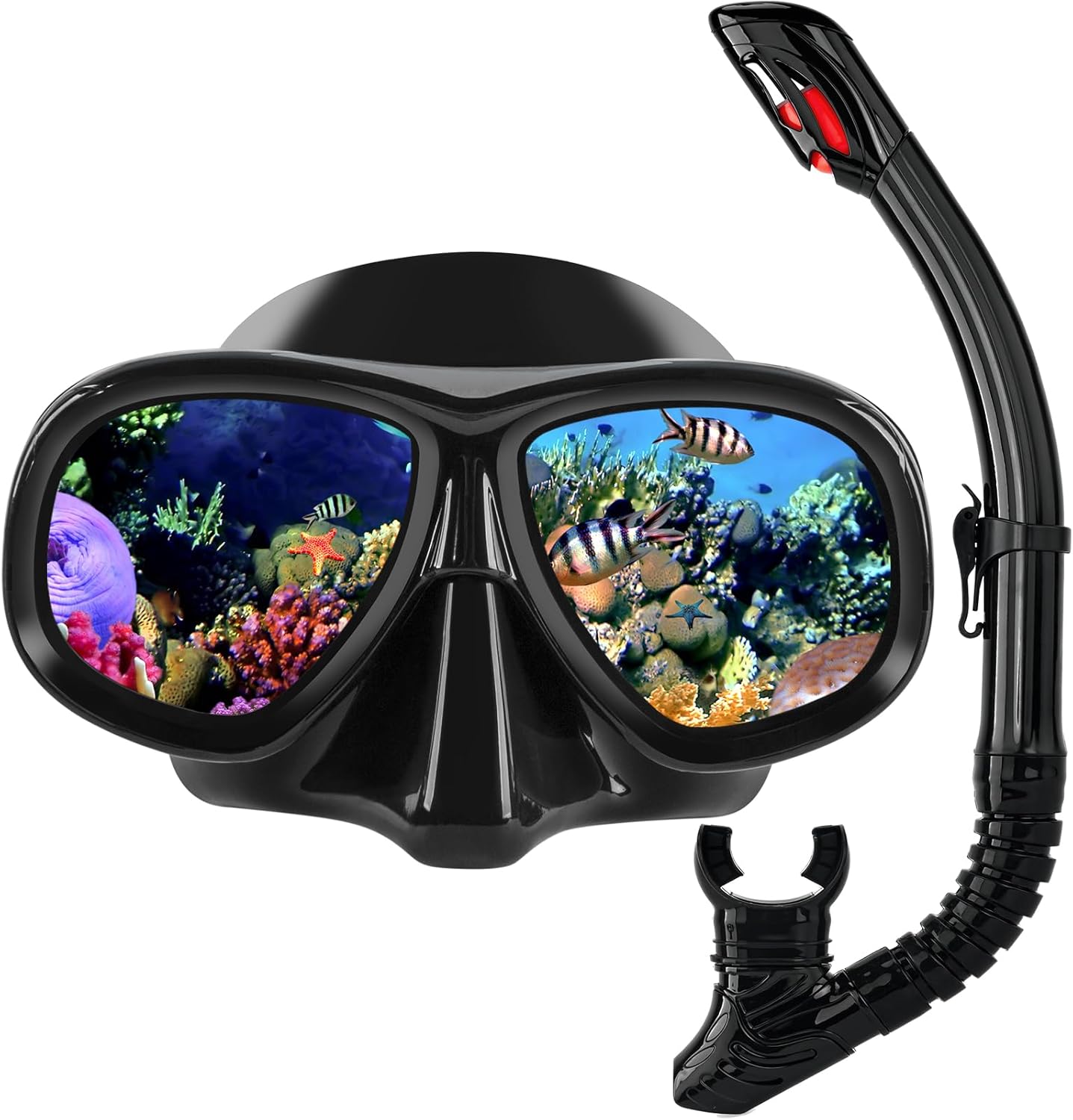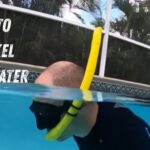Can You Snorkel While Pregnant – Expert Answer
Can you snorkel while pregnant? That’s the million-dollar question floating through the minds of every mom-to-be planning a tropical escape. You’ve already swapped your spicy tuna rolls for bland crackers, ditched hot tubs like they were lava pits, and now just when you’re craving serenity, someone dares question your right to peacefully float in paradise.
So, here’s the deal: snorkeling while pregnant is generally safe for most healthy expectant mothers, but only when done the right way, with the right gear, and under the right conditions. Yes, you can channel your inner mermaid. Just maybe not the daredevil one doing backflips over coral reefs.
Let’s unpack everything with expert precision, because your bump deserves answers, not anxiety.
Can You Snorkel While Pregnant?
Yes, you can snorkel while pregnant, assuming you’re having a healthy, low-risk pregnancy and your healthcare provider has given the green light. Snorkeling is considered a low-impact, surface-level water activity that doesn’t involve deep dives or breath-holding extremes.
Unlike scuba diving, which is not recommended due to pressure-related risks to the fetus, snorkeling keeps you at the surface, letting you breathe continuously and enjoy gentle exercise.
According to the American College of Obstetricians and Gynecologists (ACOG), swimming and similar water-based exercises are generally safe and even beneficial during pregnancy – helping with circulation, muscle tone, and stress relief.
Still, there are some clear caveats:
- Avoid rough waters or strong currents.
- Never snorkel alone.
- Stay hydrated and take frequent breaks.
- Listen to your body. That baby belly is not a flotation device.
Snorkeling While Pregnant: What to Expect in Every Trimester
Pregnancy isn’t one long, glowing Instagram photo. It’s more like a three-part saga—with each trimester bringing its own plot twists. So, when it comes to snorkeling while pregnant, the experience can feel totally different at 8 weeks than it does at 32 weeks.
Let’s break it down, trimester by trimester.
First Trimester: The “I Might Throw Up on a Turtle” Phase
That magical time when you’re growing a human the size of a raspberry… while wondering if your breakfast will boomerang back up.
Can you snorkel while pregnant in the first trimester? Technically, yes if your pregnancy is low-risk and your doctor agrees. But should you? That depends on how your body is handling the hormone hurricane.
Common first trimester issues that may affect snorkeling:
- Morning sickness (which, ironically, doesn’t care if it’s morning)
- Extreme fatigue
- Tender or sore breasts that may not love a snug wetsuit or tight straps
- Dizziness or lightheadedness (which can be dangerous in the water)
If you’re one of the lucky few who aren’t dealing with nausea or exhaustion, and your OB-GYN gives you the green light, gentle snorkeling in calm waters can be soothing. Floating weightlessly may even relieve early pregnancy bloating or back twinges.
Pro tip: Stick to short sessions, and always snorkel with someone nearby. If nausea hits mid-snorkel, you’ll want help getting back to shore not to mention a towel, ginger chews, and maybe a hug.
Second Trimester: The “I Feel Like a Mermaid” Sweet Spot
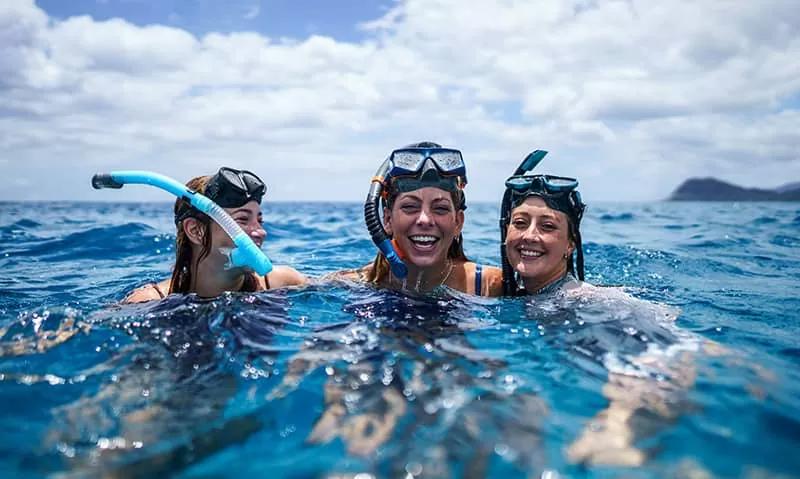
If there’s an MVP of pregnancy trimesters, the second trimester is it. Your energy often returns, the queasiness fades, and you’ve finally told people you’re pregnant (instead of blaming burritos for the bump).
Can you snorkel while pregnant in the second trimester? Yes and for many women, this is the best time to do it.
Your belly is growing but still manageable, your center of gravity hasn’t gone completely rogue, and you’re likely feeling more emotionally balanced (relatively speaking).
Benefits of snorkeling in the second trimester:
- Gentle movement supports circulation and reduces swelling.
- Floating takes pressure off joints, especially hips and lower back.
- The rhythmic breathing of snorkeling can calm the nervous system.
- It’s a great way to stay cool and connected to nature.
One mom-to-be described snorkeling at 22 weeks as “the first time I forgot I was pregnant until I looked down and saw my belly casting a shadow over the reef.”
Just remember:
- Don’t overheat or stay in the sun too long.
- Hydrate before and after snorkeling.
- Use a life vest or flotation belt for extra comfort and safety.
And yes, you can still look cute in a maternity swimsuit with a mask imprint on your face. Own it.
Third Trimester: The “Do I Look Like I Can Get in the Ocean?” Era
By the time you hit the third trimester, you’re officially the queen of waddling. Your body is working overtime. Swollen ankles, heartburn, and midnight pee marathons are now regular guests in your life.
So, can you snorkel while pregnant in the third trimester? It depends, and honesty is key.
Here’s the reality:
- Your balance may be compromised even getting in and out of the water can be tricky.
- You tire more quickly.
- Braxton Hicks contractions may pop up unexpectedly.
- You’re more prone to overheating.
- The baby may press against your lungs, making deep breathing more challenging.
That said, some women find floating in the water a huge relief. The weightlessness can ease back pain, pelvic pressure, and even improve sleep after a dip.
When Snorkeling Isn’t Safe During Pregnancy
While snorkeling is usually safe, there are times when it’s better to stay beachside with a mocktail.
Avoid snorkeling if:
- You have preeclampsia, placenta previa, or other high-risk conditions.
- You’re prone to dizziness, fainting, or leg cramps.
- You’re in your third trimester and find mobility increasingly difficult.
- You’ve been advised against travel or water activities by your OB-GYN.
Always check in with your doctor before suiting up.
Snorkeling vs. Diving While Pregnant
Here’s where confusion swims in. Many women conflate snorkeling with scuba diving, and that’s a dangerous mix-up.
Let’s clarify:
- Snorkeling = floating on the surface, breathing through a tube.
- Scuba diving = submerging with compressed air and pressure changes.
Pregnancy and diving do not go together. Scuba pregnant risks include decompression sickness, gas embolisms, and potential harm to the baby due to fluctuating pressure. So, if you’re wondering can you scuba dive while pregnant, the short answer is: Don’t.
Stick to the surface. Your snorkel isn’t just a tube, it’s your underwater passport to guilt-free fun.
But What About Oxygen? Is It Safe to Breathe Through a Snorkel?
One of the top concerns is: Can you breathe underwater with a snorkel while pregnant without harming the baby?
Yes, if you’re doing it right. Snorkeling uses surface air, not compressed gas. You’re breathing normally, just through a long tube. As long as you’re not holding your breath or hyperventilating, oxygen flow to your baby remains normal.
Pro Tip: Take calm, slow breaths. Avoid overexertion. If you feel light-headed or breathless, stop immediately.
What Should You Wear? Best Snorkeling Gear for Pregnant Women
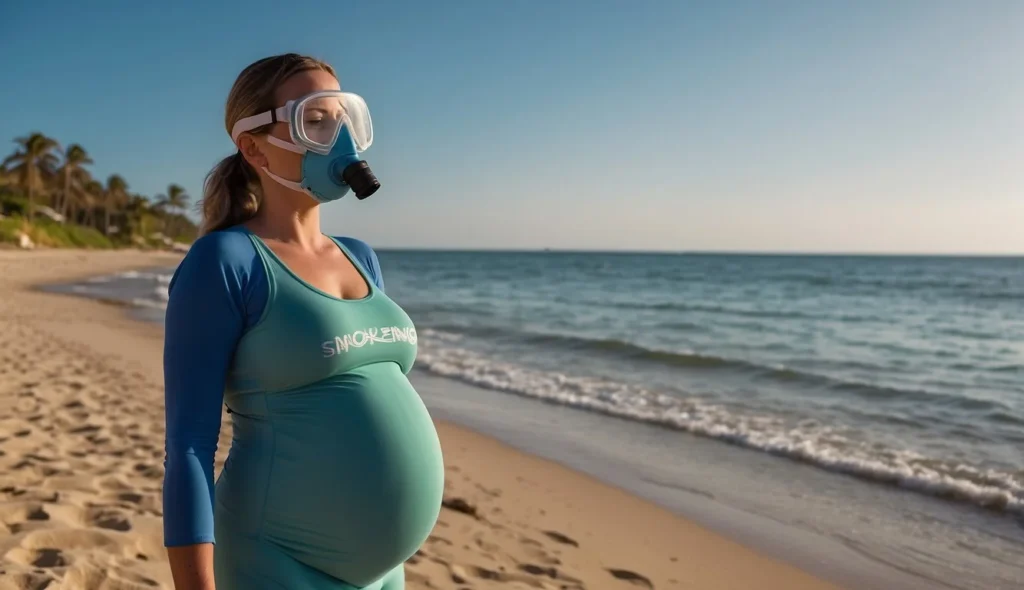
Beachwear hits differently when you’re rocking a belly. Comfort and safety are the goals here not runway vibes.
Here’s what you’ll need for snorkeling:
– Supportive Maternity Swimsuit: A one-piece with belly support and adjustable straps keeps everything secure while you float.
– Rash Guard: Provides extra sun protection and protects your skin from coral brushes or jellyfish.
– Snorkeling Mask: Choose a high-quality mask with a good seal. A fog-resistant lens is a bonus when hormones are fogging everything else in your life.
– Snorkeling Gear: Consider lightweight fins that reduce leg strain and a full-face snorkel mask for effortless breathing. How safe are full-face snorkel masks? When bought from reputable brands, they’re generally safe and offer a wide field of vision and easier breathing, but avoid knockoffs and test it in a pool first.
– Flotation Device: Yes, you can snorkel with a life vest! In fact, it’s encouraged. It helps you float effortlessly, reduces body strain, and adds a layer of safety.
– Reef-Safe Sunscreen: Pregnant skin is more sensitive. Choose a mineral-based sunscreen safe for both bump and coral reefs.
Where Can You Safely Snorkel While Pregnant?
Location matters when snorkeling with a plus-one in your belly. Look for calm, shallow beaches with lifeguards and no strong currents.
Top Babymoon-Worthy Spots:
1. Oahu
Hanauma Bay is a favorite! It’s a protected marine sanctuary with calm, shallow waters, perfect for pregnancy-approved floating.
2. Florida
Try Dry Tortugas National Park, Fort Zachary Taylor Beach, or John Pennekamp Coral Reef State Park in Key Largo. All offer gentle waters and safe entry points.
Avoid rocky beaches, rough tides, and boat-entry snorkel spots that require awkward climbs or jumps.
Red Flag Symptoms: When to Stop Immediately
You’re in the water. Everything’s great. Until… it’s not.
Stop snorkeling and seek help if you experience:
- Cramping or uterine contractions
- Dizziness or nausea
- Shortness of breath
- Vaginal bleeding or fluid leakage
- Sudden fatigue
Even if it seems minor, better safe than saltwater sorry.
Alternatives to Snorkeling If You’re High-Risk
If your OB-GYN says snorkeling’s a no-go, don’t pout under your sunhat. Try these alternatives:
- Glass-bottom boat tours: See the reef, skip the gear.
- Paddle boarding (on knees): Low-impact and relaxing.
- Shallow tide pool exploration: Dip your toes in and spot sea life.
Pregnancy is a season. The sea will still be there post-birth though possibly covered in baby floaties.
Travel Insurance and Pregnancy: What’s Covered?
Let’s be real, diving while pregnant is uninsurable. Most travel policies do not cover scuba pregnant activities due to the high risk. But snorkeling? That’s usually fine.
Still, confirm:
- Whether snorkeling is considered an “adventure sport” on your policy.
- If pregnancy-related issues are covered (some policies treat it as pre-existing).
Look for babymoon-specific travel plans that include prenatal support and emergency care abroad.
Do You Need to Know Swimming for Snorkeling?
Technically, no but practically, yes.
You don’t need to be an Olympic swimmer, but basic swimming skills are essential:
- Floating on your back
- Light kicking with fins
- Turning your head out of the water if needed
With a vest and a guide, non-swimmers can snorkel in very calm waters but pregnancy adds a variable, so caution is key.
Can You Snorkel With Glasses?
|
|
|
Great question! Standard masks don’t accommodate prescription glasses, but:
- Use prescription snorkeling masks.
- Or wear daily contact lenses with a regular mask (just don’t open your eyes underwater!).
Avoid cramming your regular glasses under a mask. That’s a one-way ticket to pain and leaks.
The Bottom Line on Can You Snorkel While Pregnant
Can you snorkel while pregnant? Yes, but only if your pregnancy is low-risk, your gear is reliable, and you follow safety best practices.
Should you snorkel while pregnant? With caution, medical clearance, and good judgment, go for it.
Pregnancy doesn’t mean you can’t enjoy the ocean. It just means you trade the deep dives for gentle glides, and swap the thrill for the tranquil. And honestly, that might be exactly what your body (and baby) need.
So, pack that snorkel, zip up that floaty maternity swimsuit, and wade into the water like the glowing sea goddess you are.
